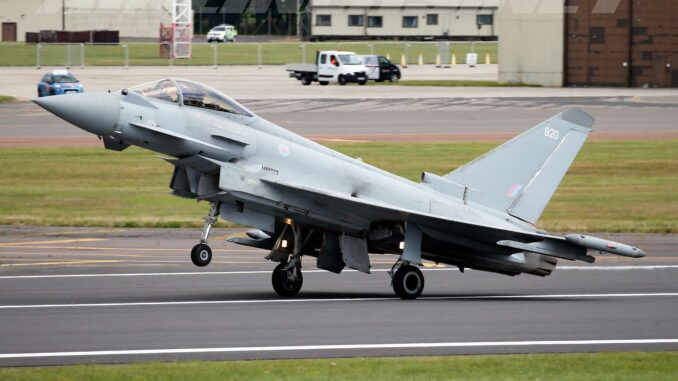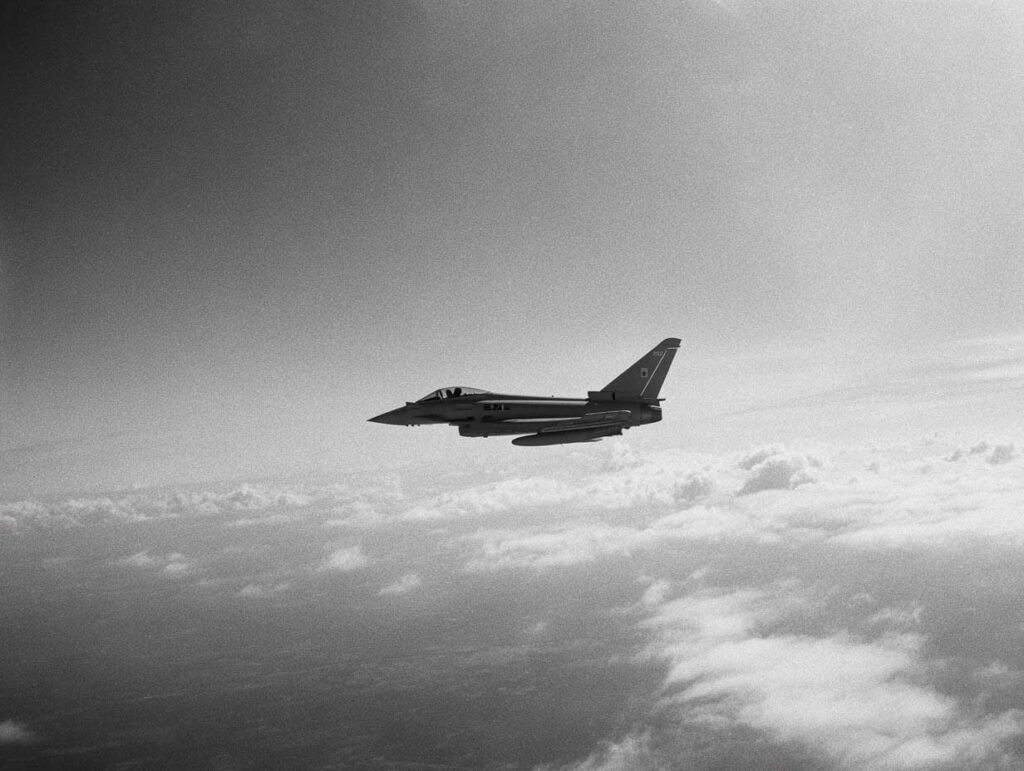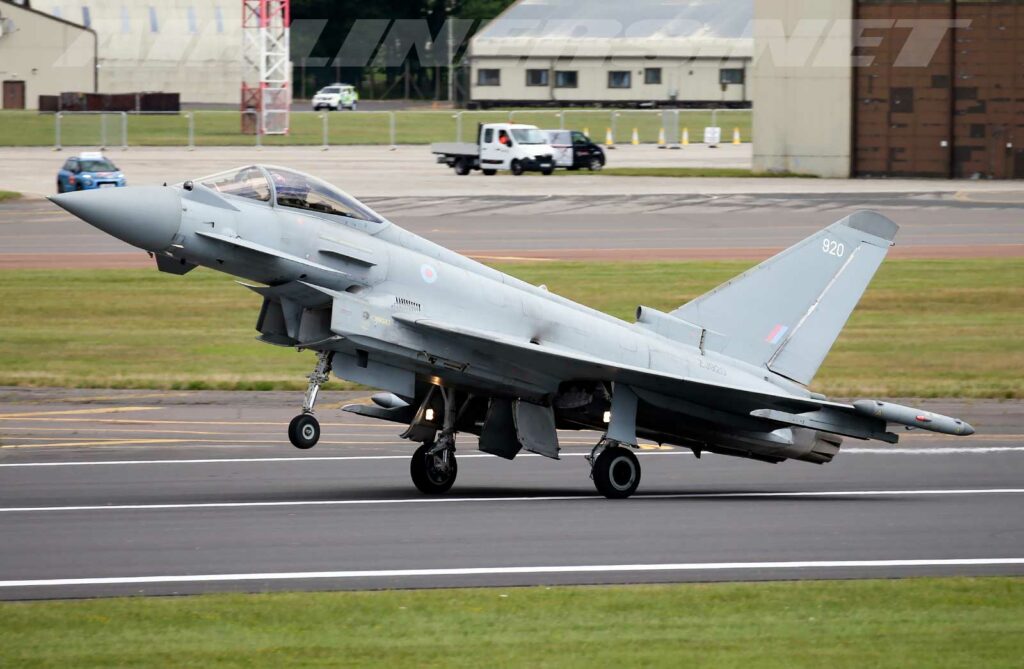
The contract for Turkey’s purchase of 20 Eurofighters for $10.7 billion is stalling: the long-range Meteor missile has been blocked by Paris.
Summary
Turkey and the United Kingdom have signed an agreement estimated at $10.7 billion (≈€9.9 billion) for the purchase of 20 Eurofighter Typhoon fighter jets from the Eurofighter program. However, the delivery and effectiveness of this acquisition will face a major obstacle: the integration of the European MBDA Meteor long-range missile, which is key to the performance of this type of aircraft. The MBDA consortium, based in France among other European countries, requires Paris’s approval for any transfer or re-export. However, France supports Greece in its disputes with Ankara and maintains ongoing diplomatic tensions, making approval for Turkey uncertain. Without this missile, Turkey would risk being at a disadvantage against the Greek forces already equipped with it. The stakes go beyond the aircraft to affect the balance of air power, the European arms industry, and regional geopolitics.

The contract: amount, number of aircraft, schedule
The agreement announced between Turkey and the United Kingdom covers the acquisition of 20 Eurofighter Typhoons worth $10.7 billion (≈€9.9 billion) according to several sources. The amount in pounds sterling was stated as £8 billion (~€9.3 billion) when the agreement was signed in Ankara on October 27, 2025.
The agreed schedule calls for the first batch of deliveries in 2030.
This purchase is part of a drive to modernize the Turkish Air Force, which wants to have a more effective fighter fleet in a context of regional rivalry.
The agreement also mentions the possibility of acquiring second-hand aircraft: Turkey plans to supplement its fleet with 12 second-hand Eurofighters from Qatar and the same number from Oman, which would bring the Turkish Typhoon fleet to around 44 aircraft.
This aspect reinforces the strategic importance of the agreement for Ankara: it is not a simple one-off purchase but a medium-term fleet program.
The Meteor missile: a technological asset and European lock
The Meteor missile is a long-range (Beyond Visual Range, BVR) air-to-air weapon developed by MBDA, a European consortium. It weighs approximately 190 kg, is 3.65 m long and has an estimated range of over 120 km (possibly up to 200 km) thanks to a ramjet engine.
This weapon gives the Eurofighter Typhoon the ability to strike targets at long range, which is essential for modern air superiority. Without Meteor, the aircraft remains effective but significantly less capable in terms of power and range.
However, Turkey may not obtain the Meteor. France, a key member of the MBDA consortium, must give its approval for the transfer or import. In the current diplomatic context, Paris is under pressure from Greece, which opposes the sale of Meteor missiles to Turkey in order to preserve its own air superiority.
Thus, without French approval or the possibility of importing the Meteor, the implementation of the Turkey-UK agreement will lose a major dimension: that of long-range capability against equipped adversaries.
The challenges of Turkish air power and regional imbalance
For Turkey, this purchase aims to fill a significant gap in its fleet. A member of NATO, it was excluded from the F-35 Lightning II program after purchasing the Russian S-400 system in 2019. It is also modernizing its aging F-16s.
Acquiring Typhoons with Meteor missiles would give Turkey a capability comparable to some of its regional rivals. But without this capability, Turkey will find itself at an immediate tactical disadvantage against opposing forces—particularly Greece, whose Rafales are already equipped with Meteor missiles.
This imbalance is far from insignificant: in the airspace of the Aegean Sea or the eastern Mediterranean, the ability to strike early or deter depends precisely on long-range weapons and aircraft capable of carrying them.
Furthermore, the choice of the Eurofighter marks a strategic shift for Turkey: previously largely dependent on American equipment, it is now diversifying its suppliers. This may give it greater geopolitical leeway, but it also exposes it to European export restrictions.
Obstacles to the agreement’s implementation
The main obstacle identified is European approval for the Meteor missile, as mentioned above. But there are others: first, the armament component of the contract is still unclear. The original text insists on a “$1 billion armament budget,” but this does not correspond to a firm missile contract.
Second, although the agreement has been signed, not all the pillars have been finalized: assembly, technology transfer, production lines, weapons integration, etc. The fact that deliveries will not begin until 2030 means that this acquisition is a long-term project.
Finally, there is the political dimension: France has tense relations with Turkey, supports Greece, and may delay or block the transfer. Furthermore, the risk of sanctions or political changes makes this type of agreement vulnerable.
These factors show that even if the contract is announced in the media, its operational implementation remains uncertain.
The industrial and geopolitical impacts for the United Kingdom, Europe, and NATO
For the United Kingdom, this contract is an industrial victory: it will maintain the Eurofighter production line and secure hundreds or even thousands of jobs at BAE Systems and among British and European subcontractors.
For Europe, the issue of arms exports to countries that have complicated relationships with certain European allies poses a challenge: how to reconcile industrial logic (export sales to make investments profitable) with strategic-political logic (alliances, geopolitical arbitration)?
Within the framework of NATO, this agreement reflects an expansion of the typically American fighter jet system to a European base. This shows that Europe can be both an exporter and a participant in the defense of the Alliance, but also that it remains dependent on national approvals for armaments.
For Turkey, this is an opportunity but also a risk: in the event of a blockage of the Meteor missile or a delay in delivery, the aircraft could become a “fighter without long-range weapons,” greatly limiting its strategic usefulness.

What this means for Turkey and its rivals
If everything goes according to plan, Turkey could have a fleet of 44 Typhoons by 2030, giving it a modern and competitive range of air capabilities. However, without the Meteor, its aircraft will remain equipped with medium-range missiles, such as the older AIM-120 AMRAAM, leaving a significant tactical gap.
For Greece, which already operates Rafale aircraft equipped with Meteor missiles, this gives it a clear air superiority advantage. Until Turkey can match these capabilities, the balance of power in the region will remain unfavorable to Ankara.
Furthermore, the introduction of this Typhoon fleet changes the strategic equation in the eastern Mediterranean and NATO airspace. It forces rivals and allies to recalculate their needs, anticipate deliveries, and assess the impact of these fighters on the regional balance.
Finally, on the domestic front in Turkey, this type of equipment can also be used as a tool for political legitimization of power, adding a domestic dimension to the agreement.
Summary and outlook
The Turkey-UK agreement for 20 Eurofighter Typhoons is significant and marks an important strategic shift for Ankara. It is part of its ambition to modernize its air force and diversify its partnerships. However, the true value of this purchase depends largely on access to the long-range Meteor missile, which is subject to France’s approval and European political dynamics.
Without this missile, Turkey could find itself equipped with modern aircraft but deprived of their key capability—long-range air-to-air strike—which would limit their role in deterrence or air superiority.
In the medium term, several scenarios are possible: either Turkey obtains the necessary authorizations and becomes a more powerful air power in the region, or the agreement drags on, or deliveries are blocked, and this case becomes a symbol of a capable but constrained contract.
In any case, this issue illustrates how the export of modern weapons depends not only on technology but also on political decisions, alliances, and national controls. It demonstrates that in air defense, aircraft alone are not enough: ammunition matters.
Sources
Reuters “Turkey’s Eurofighter Typhoon jet deal includes weapons package” (October 29, 2025)
Turkish Minute “Turkey’s Eurofighter deal with UK includes advanced weapons package” (October 29, 2025)
Defense Express “Turkiye’s Eurofighter Deal Faces Major Obstacle, France Holds Key to Meteor Missiles” (October 31, 2025)
Wikipedia “Meteor (missile),” “Eurofighter Typhoon”
War Wings Daily is an independant magazine.